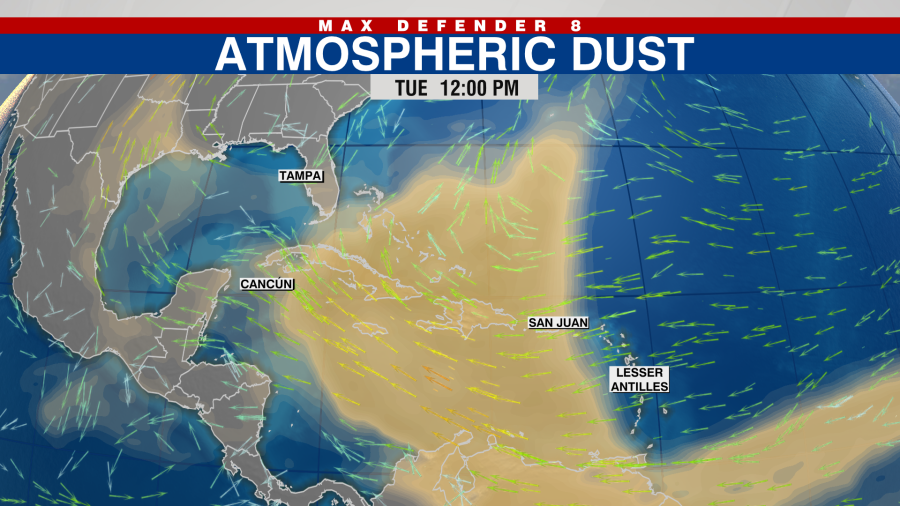Preparing For The Saharan Dust: Protecting Your Health In Florida

Welcome to your ultimate source for breaking news, trending updates, and in-depth stories from around the world. Whether it's politics, technology, entertainment, sports, or lifestyle, we bring you real-time updates that keep you informed and ahead of the curve.
Our team works tirelessly to ensure you never miss a moment. From the latest developments in global events to the most talked-about topics on social media, our news platform is designed to deliver accurate and timely information, all in one place.
Stay in the know and join thousands of readers who trust us for reliable, up-to-date content. Explore our expertly curated articles and dive deeper into the stories that matter to you. Visit Best Website now and be part of the conversation. Don't miss out on the headlines that shape our world!
Table of Contents
Preparing for the Saharan Dust: Protecting Your Health in Florida
Florida residents are bracing themselves once again for the annual influx of Saharan dust. This natural phenomenon, while a fascinating meteorological event, can pose significant health risks, particularly for vulnerable populations. Understanding the potential impacts and taking proactive steps to protect your health is crucial during these dusty periods. This article will guide you through essential preparation and mitigation strategies.
What is Saharan Dust and Why Does it Affect Florida?
The Saharan Air Layer (SAL) is a massive body of dry, dusty air that originates over the Sahara Desert in Africa. Driven by strong winds, it travels thousands of miles across the Atlantic Ocean, reaching Florida and the Caribbean during summer months (typically June to August). This dust contains fine particles, including sand, clay, and various minerals, which can significantly impact air quality.
Health Risks Associated with Saharan Dust Exposure:
Exposure to Saharan dust can exacerbate various respiratory conditions. The fine particles can easily penetrate deep into the lungs, triggering or worsening symptoms of:
- Asthma: Increased wheezing, coughing, and shortness of breath are common.
- Chronic Obstructive Pulmonary Disease (COPD): Dust can lead to increased inflammation and reduced lung function.
- Allergies: Individuals with allergies may experience heightened sensitivity and more severe reactions.
- Eye Irritation: Dust particles can cause dryness, itching, and redness in the eyes.
- Cardiovascular Issues: Studies suggest a correlation between increased Saharan dust exposure and cardiovascular problems.
Protecting Yourself During Saharan Dust Events:
Staying informed is your first line of defense. Monitor air quality reports from the Florida Department of Health and the Environmental Protection Agency (EPA). When air quality is poor, consider these protective measures:
- Limit Outdoor Activities: Reduce strenuous outdoor activities, especially during peak dust concentrations.
- Wear a Mask: An N95 respirator mask offers the best protection against fine dust particles. Surgical masks offer less protection.
- Keep Windows and Doors Closed: Minimize dust entering your home by keeping windows and doors shut.
- Use Air Purifiers: HEPA air purifiers can help filter out dust particles indoors.
- Stay Hydrated: Drinking plenty of water helps flush out irritants and keeps your mucous membranes moist.
- Take Medications as Prescribed: If you have respiratory conditions like asthma or COPD, ensure you adhere to your prescribed medication regimen.
- Check on Vulnerable Individuals: Check on elderly neighbors, individuals with pre-existing respiratory conditions, and young children who may be particularly susceptible to the effects of the dust.
Finding Reliable Information and Resources:
Staying informed is vital. Consult official sources such as the Florida Department of Health ([link to relevant Florida DOH page]) and the Environmental Protection Agency ([link to relevant EPA page]) for up-to-date air quality reports and health advisories.
Conclusion:
While the Saharan dust phenomenon is a natural occurrence, preparing for its arrival can significantly reduce its impact on your health. By understanding the risks and following the preventive measures outlined above, you can protect yourself and your family during these periods of elevated air pollution. Remember, monitoring air quality indices and taking proactive steps are crucial for minimizing the potential health consequences of Saharan dust exposure in Florida.

Thank you for visiting our website, your trusted source for the latest updates and in-depth coverage on Preparing For The Saharan Dust: Protecting Your Health In Florida. We're committed to keeping you informed with timely and accurate information to meet your curiosity and needs.
If you have any questions, suggestions, or feedback, we'd love to hear from you. Your insights are valuable to us and help us improve to serve you better. Feel free to reach out through our contact page.
Don't forget to bookmark our website and check back regularly for the latest headlines and trending topics. See you next time, and thank you for being part of our growing community!
Featured Posts
-
 Spanish Grand Prix 2025 Qualifying Live Race Updates Results And Radio Broadcast
May 31, 2025
Spanish Grand Prix 2025 Qualifying Live Race Updates Results And Radio Broadcast
May 31, 2025 -
 Analyzing The 2012 Thunder Trends And Factors Leading To The Nba Finals
May 31, 2025
Analyzing The 2012 Thunder Trends And Factors Leading To The Nba Finals
May 31, 2025 -
 Barcelona F1 Qualifying 2025 Spanish Gp Live Times Results And Radio Broadcast
May 31, 2025
Barcelona F1 Qualifying 2025 Spanish Gp Live Times Results And Radio Broadcast
May 31, 2025 -
 Family Tragedy Sheinelle Jones Mourns The Loss Of Her Husband
May 31, 2025
Family Tragedy Sheinelle Jones Mourns The Loss Of Her Husband
May 31, 2025 -
 Uche Ojeh Husband Of Today Shows Sheinelle Jones Dies From Brain Cancer
May 31, 2025
Uche Ojeh Husband Of Today Shows Sheinelle Jones Dies From Brain Cancer
May 31, 2025
